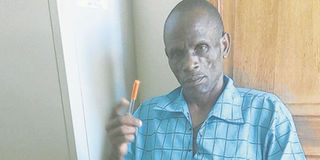Rutambuka’s inspiring story: From deathbed to life saving campaigner

Joseph’s outgoing and caring character endeared him to health practitioners at Kitete Hospital who exposed him to further training including offeringcare to the terminally ill.PHOTOI MKAMA MWIJARUBI.
What you need to know:
- He had lost hope of surviving given that at the time, in 2004, antiretroviral treatment was yet to be introduced.
- “There was no reason to believe I would ever continue living,” he says, his face looking inward reflectively.
He lived on the edge of life and death but he luckily survived. It wasn’t easy though. Apart from suffering for so long, Joseph Rutambuka, now in his 50s had to face the stigma surrounding HIV/Aids.
He had lost hope of surviving given that at the time, in 2004, antiretroviral treatment was yet to be introduced.
“There was no reason to believe I would ever continue living,” he says, his face looking inward reflectively.
Today the tall, dark, well-groomed and healthy looking Joseph is a completely different person from the feeble man who in 2004 lay in a hospital bed fighting for his life. He had been diagnosed with HIV at a time when antiretrovirals (ARVs) were not available. Luckily, as he fought for his life in hospital, antiretroviral drugs arrived and gave him new hope.
As a way to thank God for saving his life, the father of three volunteers in home-based care for people living with HIV/Aids, a path he chose to follow to help those in need of care and services.
Joseph is attached to Kitete hospital in Tabora municipality, where he assists nurses in caring for HIV positive clients. Among Joseph’s duties is following up on clients who miss their appointments and counselling new clients.
He travels the ten kilometres from his home in Isevya to the hospital by bicycle and he is a front man that the health facility cannot do without as it seeks to serve the community better. He and other home based care volunteers link clients with health care providers.
Joseph’s story of hope dates back to 2004 when he was seriously sick and a nurse and a doctor, both of whom he will never forget advised him to undergo an HIV test. Dr Amosi Seya, who was working with Eizabeth Glaser Paediatric Aids Foundation (EGPAF) and Brigita Nasura, a nurse at Kitete Hospital, are partly the reason he is alive today. Joseph will always remember their caring spirit.
“After I accepted to undergo the HIV test, the nurse asked me what I expected would be the results. I said I was ready for any result, I was not exceptional,” recalls Joseph.
Joseph and about 30 other HIV positive patients stayed in the hospital for nearly three months, waiting for antiretrovirals drugs to arrive. Thank God, with support from the US President’s Emergency Plan for Aids Relief (Pepfar), EGPAF in collaboration with the government started administering ARVs in Tanzania, particularly in Tabora.
“EGPAF staff together with Kitete hospital staff told us that the drugs were being tested in Dar es Salaam and so we had to wait. In the meantime they taught us about the drugs, how to adhere as well as how to avoid further infection.”
In the group, Joseph distinguished himself by always reminding his fellow patients the instructions from the daily lessons. His outgoing and caring character endeared him to health practitioners who exposed him to further training including palliative care. He was later absorbed in the public health system to provide home-based care, work that he has been doing for more than 10 years.
His days are usually full of activities. From giving lessons to new HIV patients on how to overcome stigma and drugs adherence to assisting nurses with documenting new and repeat visits. He also helps with weighing patients before they are put on treatment.
“When there is less work at the facility or on a scheduled day, I visit patients who have missed their appointments.” On such days he may ride up to 30 kilometres. Long distances are one of his work challenges.
“It is also challenging when you meet patients who face deep stigma. It is usually a well to do person, a dignified member of society or professionals who are more stigmatised than the poor person.”
He has witnessed lives of distinguished churchmen, sheikhs and white collar workers end prematurely because they feared sharing about their HIV status with family and friends and therefore they did not take their ARVs freely.
“When you advise a poor person to get help they gratefully agree, the rich, the famous and the educated stick their heads in the sand and eventually die quietly while help is available free of charge,” he notes.
Like all home-based care providers, Joseph only survives on a monthly stipend that barely facilitates the very work he does. Despite the fact that he also needs to provide for his family, still Joseph does not complain.
“When I am lucky to be invited to a meeting like this, or when somebody appreciates what I am doing with a material gift…that is how I get along.”
While people like Joseph provide the link between the health system and people living with HIV/Aids, their welfare remains unsorted. NGOs facilitate government efforts to equip people like him with the necessary skills to work efficiently but these NGOs’ projects often have an end and expect government to take over. In principle the government agrees with this responsibility.
In practice many volunteers find themselves oscillated between push and pull from government and NGOs— their services desired and appreciated but distanced in pay and position.
Although his job involves giving hope to those on the verge of despair, Joseph fails to give a similar impression to his last born who is in secondary school and studying hard to become a doctor.
“Truly, how will I manage when he gets to college?” This is the part of his life that he prays and hopes for another miracle like the one that happened in 2005 when he got hope to live longer than he had thought.
Otherwise he keeps a smile on his face, walks upright and wraps his language in booming colours that leave those around him inspired. Ironically those who saw him back in 2004, as he lay emaciated in hospital don’t believe their eyes when they see him. An apparition he is, they contend, for nobody can get so sick like he was and then get so healthy and so ambitious.
“I take such reactions as a compliment and use my story to restore hope in HIV positive people who have given up hope. I have been able to make many live positively.”
Joseph says the difference between how he was in 2004 and now is his motivation.
“Then I needed a miracle. Now I’m trying to pay back. If I had to pay for my medication, it would have been millions that I could not have afforded. But I have everything for free,” he says, a broad smile on his face.
Email: [email protected]




